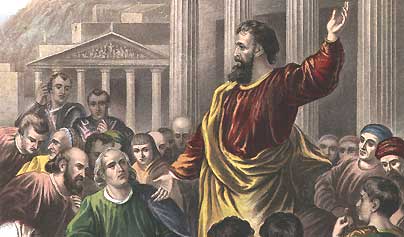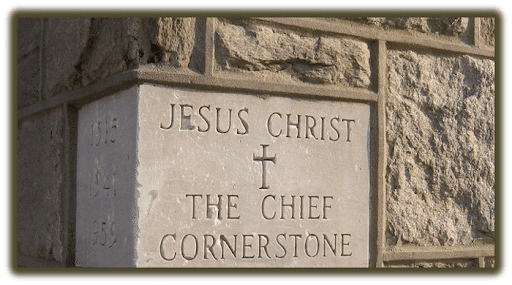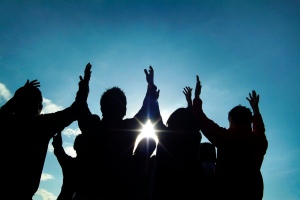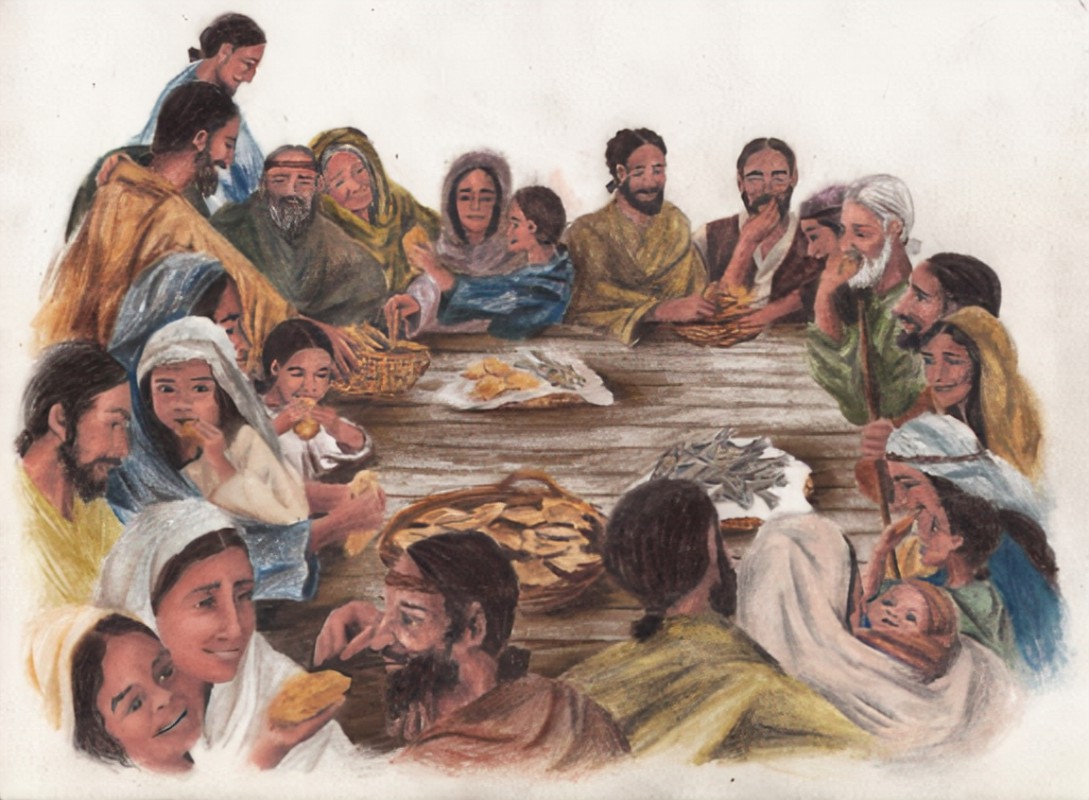Acts - Chapter 4.
Chapter 4 continues a verse-by-verse study as Peter and some of the apostles are forced to stand trial before the Sanhedrin for speading the Gospel. We will also look at the generousity of the 1st century believers as they shared of themselves with one another.
The Acts of the Apostles
Chapter 4
A lot has happened over the past two years in our study in the Book of Acts since the Day of Pentecost - the day the Church Age began. On that historical day, 3000 Jews were saved, repenting of their sins, becoming believers in Jesus Christ. From that point on, the Church grew daily, and the movement of the Church was being recognized throughout Jerusalem.
In chapter 3, we learned that the Apostles Peter and John went to the temple one day to pray and came across a lame man at the Gate Beautiful.

They ministered healing to him, and he stood up totally healed, praising God. His healing opened up the opportunity for Peter to witness the Kingdom of God to thousands of Jewish men in the area of Solomon's Porch on the temple grounds. He gave a powerful sermon where we will see in chapter 4 that 5000 men repented and believed in Jesus as their Messiah.
The Arrest of the Apostles Peter and John

Chapter 4 is a continuance of the same scene from chapter 3 with Peter witnessing to a crowd of thousands of men on the temple mount in Solomon’s Portico. In the middle of Peter's preaching, suddenly, the captain of the guard of the temple jail and grounds came on the scene, along with several Sadducees and priests of the Sanhedrin Council to have them arrested.
ACTS 4 1. Now as they spoke to the people, the priests, the captain of the temple, and the Sadducees came upon them, 2 being greatly disturbed that they taught the people and preached in Jesus the resurrection from the dead. 3 And they laid hands on them, and put them in custody until the next day, for it was already evening. 4 However, many of those who heard the word believed; and the number of the men came to be about five thousand.
Why do you suppose these elders and Sadducees wanted to have Peter and John arrested? If you recall back, Peter was preaching that Jesus was resurrected from the dead, and we learned from chapter 3 that Sadducees did not believe in any resurrection. In other words, there was no life after death, so they claimed, and here were many Sadducees who were the elders within the Sanhedrin Council, including the high priest who felt threatened and wanted these apostles arrested. Since the Sadducees carried the largest percentage on the Council, they carried the most power. So, not believing in any resurrection was enough for the Sanhedrin Council to take anger toward these followers of Jesus, and they carried enough power to have them arrested.
The Sanhedrin Council was jealous of anything to do with Jesus. It began while Jesus was alive, and now His followers became a threat to the Sanhedrin Council.
The more it was claimed that Jesus was their Messiah, the more His presence became a threat to the Sanhedrin Council. So they had Him crucified. And now, even after His death, Jesus had apostles and disciples who became His followers, claiming He was resurrected from the dead. Three thousand people became believers in Jesus at Pentecost with the movement spreading fast throughout Jerusalem. NOW 5000 more people were just coming to believe in Jesus.
This new movement of the Church was a huge threat to the Sadducees and Pharisees livelihood, their reputation as elders in the Sanhedrin Council, and literally, if this got out of hand could destroy the Sanhedrin Council as well. This movement had to stop. With Peter and John witnessing to these thousands of Jews on the temple grounds gave good opportunity to have them arrested. So, those of the Sanhedrin Council contacted the captain of the temple grounds and had them arrested on false charges.
Antonio's Prison
Because it was nearing the end of the day, off to Antonio’s fortress Peter, John, and the healed lame man were taken to spend the night in order to face the Sanhedrin Council in the morning.

Antonio's Fortress was a prison attached to the temple in the back.
It was meant for rioters and those who disturbed the peace in any way on the temple grounds.
The fortress consisted of a captain and several guards who roamed the temple grounds to keep
the peace as thousands upon thousands of Jews and even Gentiles attended the temple grounds daily.
On Trial
5 And it came to pass, on the next day, that their rulers, elders, and scribes, 6 as well as Annas the high priest, Caiaphas, John, and Alexander, and as many as were of the family of the high priest, were gathered together at Jerusalem. They stood before the highest court in Israel for the Jews – 70 men in all…or as many who could be gathered.
The high court of the Sanhedrin Council would have been like Americans standing trial in front of the Supreme Court in Washington D.C. to defend their faith in Jesus Christ to judges who were all unbelieves in Jesus. Automatically, they would have been determined guilty because of the bias of the Council. Here, Peter and John stood in front of Annas the high priest, along with Caiaphas, who would become the next high priest, rulers, elders, scribes and several others who were from the family of the high priests. All in all there were about 70 who had the power to put them in prison.
7 And when they had set them in the midst, they asked, “By what power or by what name have you done this? 8 Then Peter, filled with the Holy Spirit, said to them, “Rulers of the people and elders of Israel: 9 If we this day are judged for a good deed done to a helpless man, by what means he has been made well, 10 let it be known to you all, and to all the people of Israel, that by the name of Jesus Christ of Nazareth, whom you crucified, whom God raised from the dead, by Him this man stands here before you whole.
"By what name and what power have you done this," shouted these rulers. I’m sure Peter and John felt very intimidated as they stood in the midst of the Council of 70 ruling elders whom they already knew did not believe in Jesus. Not knowing if prison awaited them, or would they be set free, they had to go beyond that fear and rely upon the power of the Holy Spirit that dwelt within them. Peter then braving himself up, as he was filled with the power of the Holy Spirit spoke out: ”Are we to be judged for doing a good deed to a helpless man, by which he was made well?" Completely under the anointing of the Holy Spirit, Peter boldly continued: "Let it be known to you all, and to all the people of Israel, that by the name of Jesus Christ of Nazareth, WHOM YOU CRUCIFIED, whom God raised from the dead, by Him this man, who was lame, stands before you whole."
Can you imagine the fury on the faces and the sounds of the loud screams of these rulers over Israel as they screamed at Peter? Remember, the Sadducees, who were the majority of the Sanhedrin Council, along with the high priest being a Sadducee, did not believe in the resurrection from the dead. They, too, were very threatened by these two men for fear of losing their positions of power. Both sides were intimidated and threated by the other, but for different reasons.
Jesus the Cornerstone

11 This is the ‘stone, Peter continued referring to Jesus here, which was rejected by you builders, which has become the chief cornerstone.’ 12 Nor is there salvation in any other, for there is no other name under heaven given among men by which we must be saved.”
Comparing Jesus to a cornerstone of a building - if what you believe about Jesus is set correctly,
the rest of the building blocks of your faith will work together and your faith will endure.
But if your cornerstone is off, and not set correctly, the building will collapse.

Peter compared the foundational belief in Jesus to the chief cornerstone of a building, which is the anchor that hold the while building up, and without it the building will collapse. In other words, Jesus was now the anchor of the Law of Moses, being the arrival of their Messiah, which was prophesied throughout the Scriptures. These religious leaders and teachers of the Sanhedrin Council, however, wanted themselves, along with the Sanhedrin Council, to be the chief cornerstone of what Israel had believed and supported. This movement of Jesus Christ was a real threat to the elders of the Council.
Jesus is our cornerstone – the foundation of our faith. If our Christian faith is not anchored in Jesus, our faith will falter.
Our faith in Jesus is far more than a head knowledge belief in hoping that someday we will go to heaven instead of hell. Being a Christian is centered around Jesus. He’s our Savior and our Lord. It’s because of Him we now belong to the Kingdom of God. We belong to the Family of God – what a privilege that is. God wants us to bring as many people with us into God’s Kingdom as we can. That means bringing Jesus to a lost world. And that is what Peter and John were doing when they were arrested for preaching Jesus
13 Now when they saw the boldness of Peter and John, and perceived that they were uneducated and untrained men, they marveled. And they realized that they had been with Jesus.
The elders of the Sanhedrin Council saw that Peter and John were bold in their preaching about Jesus, but they also saw and heard that they were uneducated and untrained men, probably from the area of Galilee because they spoke a backward dialect of Aramaic. They certainly were not one of the elitists of Jerusalem or any other upper society of Jews from Israel. They could see, however, the miracle of the lame man who stood healed in their midst by the hands of these backward disciples of this Jesus, whom they feared. As such, became even more afraid of them, and more furious.
14 And seeing the man who had been healed standing with them, they could say nothing against it.
The healed lame man also spent the night in jail with Peter and John, and there he stood healed in the presence of the Sanhedrin Council, and by now news of his healing had spread all over Jerusalem. So what is the Sanhedrin to do now? The whole city already knows about this.
15 But when they had commanded them to go out of the council, they conferred among themselves, 16 saying, “What shall we do to these men? For, indeed, that a notable miracle has been done through them is evident to all who dwell in Jerusalem, and we cannot deny it. 17 But so that it spreads no further among the people, let us severely threaten them, that from now on they speak to no man in this name.” 18 So they called them and commanded them not to speak at all nor teach in the name of Jesus.
The three men were commanded to leave the room while the Sanhedrin Council privately made a decision of their fate. The Council, however, could find no fault in Peter and John, but they didn’t know what to do with them. They could see a miracle had happened – everyone could see it, but they had to stop this from continuing. After all, their reputation and livelihood depended on it. They chose to warn these men to never speak or teach the name of Jesus ever again in public.
The Sentencing
19 But Peter and John answered and said to them, “Whether it is right in the sight of God to listen to you more than to God, you judge. 20 For we cannot but speak the things which we have seen and heard.” 21 So when they had further threatened them, they let them go, finding no way of punishing them, because of the people, since they all glorified God for what had been done. 22 For the man was over forty years old on whom this miracle of healing had been performed.
Still filled with the Holy Spirit, refusing to let fear rule in them, Peter and John said they had to obey God over the demands of the Council. After all, even those of the Council knew that the Scriptures claimed that God must be loved first over everything. Now even more furious, the high priest of the Sanhedrin Council threatened them again, even though they could find no fault in them, so all charges had to be dropped. Had they sentenced them to a flogging, which was typically done, the whole city would have been in an uproar because by now these 5000 new believers and its crowds had spread the news of their salvation all over Jerusalem. So they threatened them again to never speak the name of Jesus and then let them go.

Personal application: What about you? We all run into situations where we risk alienation if we speak the name of Jesus - social gatherings, work environment, even in family situations where you risk alienation from the people around us. Do we let fear overcome us, or do we rely on the wisdom of the Holy Spirit and are obedient to His leading when to speak and when to be silent? The important thing is that we don’t let fear stop us from witnessing Jesus to those around us.
Released

23 And being let go, they went to their own companions and reported all that the chief priests and elders had said to them .
Relieved, Peter and John quickly left and went back to their own companions, or their own company in the faith. Our own company means like-minded believers who carry the same beliefs in our faith, where we can pray together, openly share our faith with one another, and just be ourselves with other like-minded believers.
Scripture does not say what happened to the healed man; hopefully, he joined the company of believers where they congregated together.
Prayers of Praise and Thanksgiving
24 So when they, meaning Peter and John’s company of believers, heard that (meaning the healing of the lame man, 5000 people being saved unto Jesus, and their release of being in jail), they raised their voice to God with one accord and said: “Lord, You are God, who made heaven and earth and the sea, and all that is in them, 25 who by the mouth of Your servant David have said: ‘Why did the nations rage, And the people plot vain things? 26 The kings of the earth took their stand, And the rulers were gathered together. Against the LORD and against His Christ.’ 27 “For truly against Your holy Servant Jesus, whom You anointed, both Herod and Pontius Pilate, with the Gentiles and the people of Israel, were gathered together 28 to do whatever Your hand and Your purpose determined before to be done.
Praising God, Peter led over his company of believers by quoted King David in a unified prayer from Psalm 2 showing that prophecy had to be fulfilled. As such, this company of believed and understood they were surrounded by those in rage, plotting evil against them. They also knew they should expect opposition, but not be troubled because God was in control of all things, even in the midst of those in power, who plotted against Jesus Christ the anointed. Those in power included those of the Sanhedrin Council, King Herod, Pontius Pilate, the Gentiles and the people of Israel who were all against Jesus and His followers.

Personal Application: As believers, when we pray, we must see our circumstances through the filter of God’s Word. The Word of God is filled promises of victory for every situation in life, and when we find ourselves in a situation, we need to go to the Word of God and find a promise that gives us hope. As we keep repeating God’s promise over and over, it will work its way down into our heart to become a part of the core of our belief system.
Take God at His Word and let God’s promise become your victory, regardless of those who plot against the things of the Lord.
29 Now, Lord, look on their threats, and grant to Your servants that with all boldness they may speak Your word, 30 by stretching out Your hand to heal, and that signs and wonders may be done through the name of Your holy Servant Jesus.”
While knowing the dangers they continuously faced, their prayers were not to be released from their persecution, but they asked for more boldness to speak the Word of God so more signs and wonders and healings could be done in the name of the Lord Jesus. In that way, more and more people will be saved and God would get the glory.

Personal Application: Can we do that regardless of the dangers we face surrounding us? Can we ask for more boldness to give testimony to Jesus? Can we ask for more boldness to do the works of the Lord - So God will get the glory?

31 And when they had prayed, the place where they were assembled together was shaken; and they were all filled with the Holy Spirit, and they spoke the word of God with boldness.
Whether the place where they were assembled was literally physically shaken, like an earthquake, we do not know. It could have been a spiritual shaking of the house where the disciples were assembled together. As such, they were all filled with the Holy Spirit again. In other words, the experience on Pentecost was repeated.
Being baptized in the Holy Spirit, with the evidence of speaking in tongues is the evidence of being spirit filled; however, the Scriptures tell us that being filled is not a one-time experience. We are to be continually filled with the Holy Spirit. Jude 20 But you, beloved, building yourselves up on your most holy faith, praying in the Holy Spirit. For me, personally, I probably pray more in the Holy Spirit than I do in English – off and on all day. It’s my way of keeping connected with God all day – to hear His voice so I can follow after Him.
The apostles and disciples of Jesus received the boldness they asked for, of which they, and us today need. Boldness is a gift from God, received through prayer. We can’t congure up boldness - we receive as a gift from God. We must, however, yield ourselves continually to the Holy Spirit, seeking God for boldness to speak on behalf and for the Kingdom of God.
Sharing With Those in Need

32 Now the multitude of those who believed were of one heart and one soul; neither did anyone say that any of the things he possessed was his own, but they had all things in common. 33 And with great power the apostles gave witness to the resurrection of the Lord Jesus. And great grace was upon them all.
These apostles and disciples all had the love of, and the belief in Jesus in common with one another. This kind of unity gave evidence of the Holy Spirit working within them. Everyone didn’t necessarily think alike, for they were people from various walks of life, but they loved Jesus, and was in unity in their purpose and goals. As such, they shared their things with one another as there was need and spoke out boldly about Jesus and His resurrection from the dead.
34 Nor was there anyone among them who lacked; for all who were possessors of lands or houses sold them, and brought the proceeds of the things that were sold, 35 and laid them at the apostles’ feet; and they distributed to each as anyone had need.
Ever since the Day of Pentecost, which was two years earlier, there were large number of new believers who needed support. Some were local, but were osterized from family and friends, cast out of their homes, while there were also many from distant lands and remained in Jerusalem to learn more about Jesus from the apostles who went around boldly preaching the Gospel. Without permanent homes and jobs, those who stayed in Jerusalem to learn more about being followers of Jesus needed special support from the Christian community.
36 And Joses, who was also named Barnabas by the apostles (which is translated Son of Encouragement), a Levite of the country of Cyprus, 37 having land, sold it, and brought the money and laid it at the apostles’ feet
Joses, who was also named Barnabas was probably of the seventy disciples who followed Jesus in His ministry before His crucifixion. We will also see Barnabas later in this study of the Book of Acts as a traveling companion to the Apostle Paul on his first mission trip. Barnabas was from the Island of Cyprus, known for being generous with more than material things; He gave out encouragement – so much the Church called him Barnabas, which meant Son of Encouragement.
Some have said that the early church went into communal living. While there were some who sold things – including land and possessions, they recognized God’s ownership of everything they possessed, and because God had touched their lives so deeply, they found it easy to share all things in common. When a need arose, they gave what they had to help others. This situation brought the people to share, maybe even housed certain new believers, but God is not asking His people to make a practice of communal living. The early disciples simply filled a temporary need to help others who needed help at that particular time.
We will end chapter 4 here
Click here for Acts - Chapter 5






